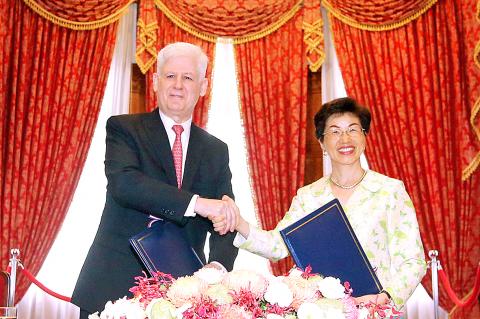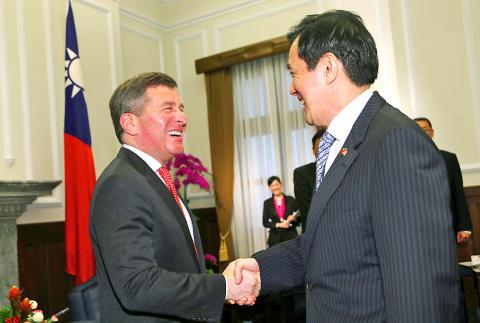Taiwan and the US yesterday signed a memorandum of understanding on the Global Cooperation Training Framework to enhance bilateral cooperation in responding to global challenges, a move visiting US Assistant Secretary of State for Economic and Business Affairs Charles Rivkin said would “take our partnership to new areas and a new level.”
Before witnessing the signing ceremony at the Taipei Guest House, Rivkin had a closed-door meeting with President Ma Ying-jeou (馬英九) at the Presidential Office Building to discuss what he said were “matters of importance to our economies.”
Rivkin, responsible for managing trade negotiations, investment treaties and other economic issues at the US Department of State, is the highest-ranking official to have visited Taiwan since his predecessor Jose Fernandez in 2012.

Photo: CNA
In remarks to reporters before his meeting with Ma, Rivkin said people in the US feel “a special bond” with Taiwanese for various reasons.
People in the US admire the robust, prosperous, orderly and free society Taiwan has built, and they share a belief that creating an environment conducive to expansive entrepreneurial activity and innovation is important to continuing economic prosperity, Rivkin said.
Citing statements made recently by various US officials on Taiwan-US relations, Ma said he was “positive” about Taiwan’s chances as a second-round candidate to join the Trans-Pacific Partnership.

Photo: CNA
Ma said he hoped negotiations over a bilateral investment agreement would gain ground.
Rivkin told attendees to the signing ceremony that the framework would not only support broader Taiwan-US relations, but also serve as a platform to enhance their joint engagement in the Asia-Pacific region and the world.
Under the framework, “two like-minded partners will work to create new opportunities to demonstrate the meaning of global citizenship,” Rivkin said.
“The framework is a milestone that will bring into full focus Taiwan’s dramatic transformation from an international aid recipient to an aid provider. This framework will provide Taiwan [with] a new venue to tell its story in a way that may inspire others to follow its successful development path,” he said.
Deputy Minister of Foreign Affairs Andrew Kao (高振群) said Rivkin’s attendance of the ceremony was a testament to the strength of Taiwan-US relations.
Taiwan has much to offer to the international community in food security, global health, technical training, economic development and humanitarian assistance, Kao said.
“With this ever-expanding partnership with the US, we will work harder to create tangible and mutually beneficial outcomes for the region and the world,” Kao said.
The memorandum of understanding was signed by American Institute in Taiwan Director Christopher Marut and Coordination Council for North American Affairs Chairperson Katherine Chang (張小月).

AIR SUPPORT: The Ministry of National Defense thanked the US for the delivery, adding that it was an indicator of the White House’s commitment to the Taiwan Relations Act Deputy Minister of National Defense Po Horng-huei (柏鴻輝) and Representative to the US Alexander Yui on Friday attended a delivery ceremony for the first of Taiwan’s long-awaited 66 F-16C/D Block 70 jets at a Lockheed Martin Corp factory in Greenville, South Carolina. “We are so proud to be the global home of the F-16 and to support Taiwan’s air defense capabilities,” US Representative William Timmons wrote on X, alongside a photograph of Taiwanese and US officials at the event. The F-16C/D Block 70 jets Taiwan ordered have the same capabilities as aircraft that had been upgraded to F-16Vs. The batch of Lockheed Martin

US President Donald Trump yesterday announced sweeping "reciprocal tariffs" on US trading partners, including a 32 percent tax on goods from Taiwan that is set to take effect on Wednesday. At a Rose Garden event, Trump declared a 10 percent baseline tax on imports from all countries, with the White House saying it would take effect on Saturday. Countries with larger trade surpluses with the US would face higher duties beginning on Wednesday, including Taiwan (32 percent), China (34 percent), Japan (24 percent), South Korea (25 percent), Vietnam (46 percent) and Thailand (36 percent). Canada and Mexico, the two largest US trading

GRIDLOCK: The National Fire Agency’s Special Search and Rescue team is on standby to travel to the countries to help out with the rescue effort A powerful earthquake rocked Myanmar and neighboring Thailand yesterday, killing at least three people in Bangkok and burying dozens when a high-rise building under construction collapsed. Footage shared on social media from Myanmar’s second-largest city showed widespread destruction, raising fears that many were trapped under the rubble or killed. The magnitude 7.7 earthquake, with an epicenter near Mandalay in Myanmar, struck at midday and was followed by a strong magnitude 6.4 aftershock. The extent of death, injury and destruction — especially in Myanmar, which is embroiled in a civil war and where information is tightly controlled at the best of times —

China's military today said it began joint army, navy and rocket force exercises around Taiwan to "serve as a stern warning and powerful deterrent against Taiwanese independence," calling President William Lai (賴清德) a "parasite." The exercises come after Lai called Beijing a "foreign hostile force" last month. More than 10 Chinese military ships approached close to Taiwan's 24 nautical mile (44.4km) contiguous zone this morning and Taiwan sent its own warships to respond, two senior Taiwanese officials said. Taiwan has not yet detected any live fire by the Chinese military so far, one of the officials said. The drills took place after US Secretary